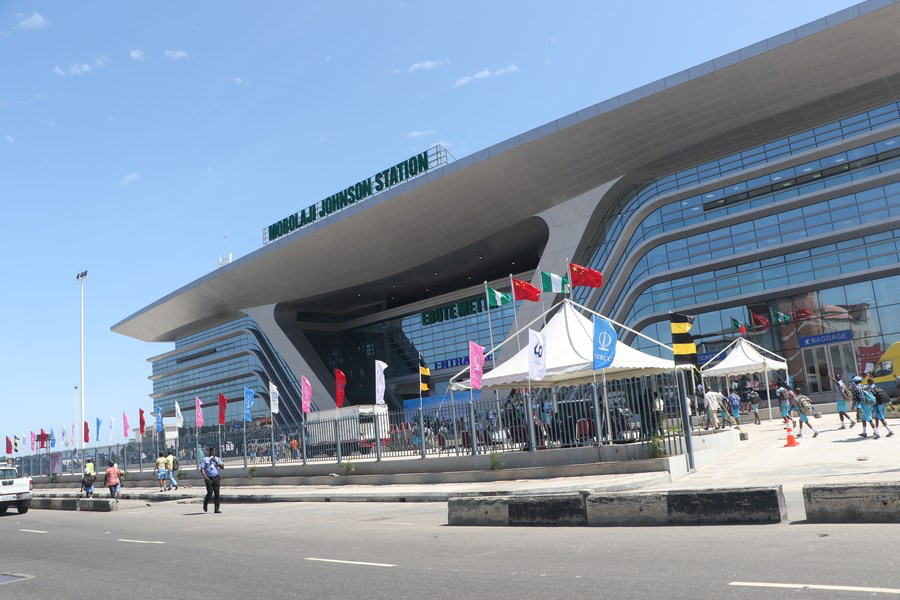Published: January 09,2024

Photo taken on June 10, 2021, shows an exterior view of the Mobolaji Johnson Railway Station of the Lagos-Ibadan railway in Lagos, Nigeria. (Photo by Emma Houston/Xinhua)
Boarding an Ibadan-bound train at the iconic Mobolaji Johnson Station in Lagos, Nigeria’s economic hub and most populous city, a family of six settled into their seats in one corner of a second-class coach, their laughter filling the air with the energy of Yuletide (Christmas season) holiday anticipation.
Boarding an Ibadan-bound train at the iconic MobolajiJohnson Station in Lagos, Nigeria’s economic hub and most populous city, a family of six settled into their seats in one corner of a second-class coach, their laughter filling the air with the energy of Yuletide (Christmas season) holiday anticipation.
Adeniyi Salaudeen, a middle-aged man and head of the family, with a contagious smile, shared stories of past Christmas holidays with his wife and four children amid admiration for the modest coach they sat in. The children, wide-eyed with excitement, peered out of the window, eager to catch the first glimpses of the passing landscape through the jolly train ride in late December, 2023.
“I have had this experience before, going through the train. I really enjoyed the trip,” Salaudeen told Xinhua in an interview as the train’s whistle blew, signaling the commencement of the journey to Ibadan, an enchanting city in southwestern Nigeria. “This holiday season, I decided to come to Lagos with my family. The feeling I have had is still the same. I enjoyed the experience!”

Trains park on the track at the Mobolaji Johnson Railway Station of the Lagos-Ibadan railway in Lagos, Nigeria, on June 10, 2021. (Photo by Emma Houston/Xinhua)
The Lagos-Ibadan railway, a major project of the China-proposed Belt and Road Initiative (BRI), it was constructed by the China Civil Engineering Construction Corporation (CCECC) and links the southwestern cities of Lagos, Abeokuta, and Ibadan. The railway officially started full commercial operation in 2021, easing public transportation and fuel goods movement in the country. The project is the first double-track standard-gauge railway to be built in West Africa.
In the Abuja-Kaduna corridor, inaugurated earlier in 2016, train passengers have also expressed excitement about traveling to meet their loved ones on the Chinese-built trains “that have continued to be a lifeline for many citizens during this festive season.”
Nigeria has been grappling with staggering inflation, which currently stands at 28.2 percent, rendering transportation unaffordable for many low-income earners. Heightened insecurity has also recently plagued road travel.
“With the cost of air travel skyrocketing, the train service offers an affordable and secure means of transportation, bridging the gap for those who would have otherwise been unable to travel back home,” Omotola Fayehun, a passenger traveling to the northwestern part of Nigeria through the Abuja-Kaduna train service, told Xinhua.
Fayehun, a secondary school administrator, said the Chinese-built rail services have emerged as a secure and more affordable alternative for Nigerians eager to reunite with their families during the Yuletide and other festive periods.
“The joyous experiences of Nigerians traveling on the Lagos-Ibadan and Abuja-Kaduna train services stand out as a beacon of hope and unity during these challenging times. The affordability and safety are unmatched, especially considering the current economic situation,” he said.

People try out a train trip following a ceremony to flag off the commercial operation of the Lagos-Ibadan railway at the Mobolaji Johnson Railway Station in Lagos, Nigeria on June 10, 2021. (Photo by Emma Houston/Xinhua)
The train services have standard class, business class, and executive class — making it a truly veritable means of transportation for all classes of people. Its air-conditioned coaches are each outfitted with three overhead television screens. The toilets are clean and well-equipped.
The window seats have electric sockets and USB charging ports. Also worthy of mention is the attentive crew, including nurses and security personnel on board, in case of emergencies.
During a recent trip to Ibadan ahead of the new year celebration, a group of elderly passengers sitting in the business-class compartment of the train held conversations that traversed decades, weaving a narrative that mirrored the passage of time and nostalgia.
The expression on the face of 90-year-old Pa Makanjuola Azeez reflected “a great feeling of joy” as he anticipated the reunion with his grandchildren in Abeokuta.
“When I was younger, I was a regular user of the train between Abeokuta and Lagos. I schooled in Abeokuta and my parents were in Lagos. Presently, the road service was really very poor due to bad roads,” Pa Azeez said, traveling back in time to the olden days.
“Now, when I go to Abeokuta for leisure, I go by train. It is really superb and very encouraging. Since I have been using this service, I have been introducing it to my friends and relatives,” the nonagenarian said.
Michael Egbo, an Abeokuta-based businessman, expressed delight over the convenience and security of using the train, especially as this would, in his opinion, promote tourism and trade.
Several times, he had traveled by road to neighboring West African countries during past Christmases with his family. He recalled their vehicle got stuck in the middle of nowhere during one of the “risky adventures.”
“You can imagine an entire family in a thick bush at midnight, with no phone network or internet signals. We later got help and survived,” Egbo said, adding his family recently agreed to embark on another vacation but only with the option of a train.
“I have been using the train service for a while, but I wanted my children to have the experience. It is a family vacation. The journey is smooth, hassle-free, and fast,” he added.
Xinhua
 Africa -China Review Africa -China Cooperation and Transformation
Africa -China Review Africa -China Cooperation and Transformation
